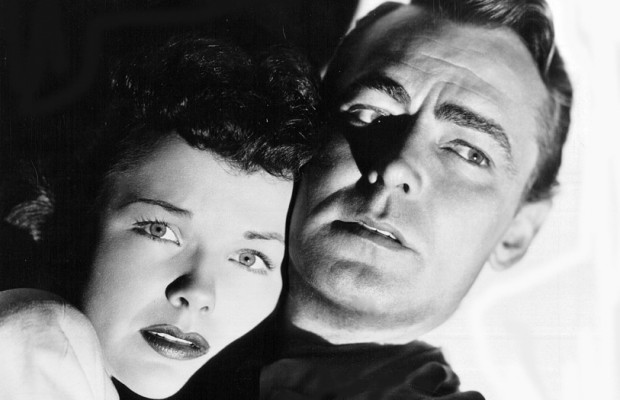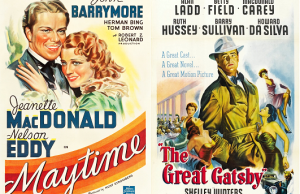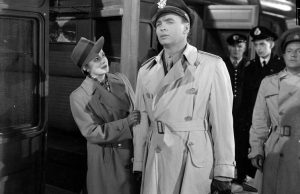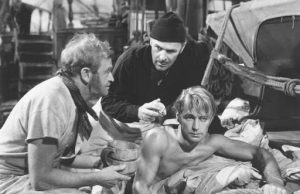Captain Carey, U.S.A. (1950)

Toronto Film Society presented Captain Carey, U.S.A. on Sunday, April 6, 2014 in a double bill with The Rack, as part of the Season 66 Sunday Afternoon Film Buff Series, Programme 7.
This postwar drama was filmed under the title O.S.S., but that was changed to After Midnight during post-production. The studio finally settled on releasing it as Captain Carey, U.S.A. It introduced the haunting song “Mona Lisa” (performed in the film by Charlie Spivak with Tommy Lynn), which became the first from a non-musical film ever to win the Oscar for Best Original Song. It was also the first not sung in English to win the award. The more familiar English language version was a huge hit for Nat King Cole, spending eight weeks in the number one spot on the Billboard singles chart. It has since been recorded by dozens of others. Cole’s version of the song was inducted into the Grammy Hall of Fame in 1992. The song even inspired the name of a movie, the British noir Mona Lisa (1986), which starred Bob Hoskins. The Nat King Cole version was prominently featured in its soundtrack.
War’s messy aftermath was something this film’s leading lady knew only too well. Though she never went near a battlefield, unforeseen postwar issues eventually derailed her career. But, at the outset, she held great promise. Pretty, petite DIXIE WANDA HENDRIX hailed from Jacksonville, Florida, where her father worked as a logging camp boss. Young Wanda enjoyed performing in the town’s little theatre group, which brought notice from a talent scout in 1945. When the teenager was hired by Warner Brothers, her family moved with her to California. Starlets generally spent more time posing for cheesecake photos than doing much acting, but Wanda was the exception. She was immediately cast in a prominent, very effective role in a major film–as a heroic waif in Confidential Agent, with Charles Boyer. This exposure led to other good parts. One of her best roles came in 1947’s Ride the Pink Horse. The critics were impressed, and there was even talk of an Oscar nomination. She continued to do well with the light comedy Miss Tatlock’s Millions (1948) and the melodrama My Own True Love (1949). Then she fell in love in real life, and serious troubles began.
Handsome war hero Audie Murphy spotted Wanda gracing the cover of Coronet magazine, and immediately arranged a meeting. He was America’s most-decorated and most-publicized WWII soldier. His was truly a rags-to-riches story; he was a poor sharecropper’s son who’d only gotten as far as the fifth grade in school. He was photogenic and likable, and went on to postwar movie stardom, making westerns at Universal. Audie swept her off her feet, and they quickly married. But it was far from the fairy-tale/hero’s reward/happily-ever-after union gushed over by the fan magazines. Their marriage came fully equipped with terrible trouble, and Wanda was totally unprepared for it.
There was soon strife between the newlyweds because possessive Audie wanted Wanda to give up her career, but that proved to be the least of their worries. There is a major downside to heroism that didn’t get much publicity back then. It was not a new problem by any means; it’s probably as old as mankind had been experiencing traumatic events. But the 20th Century’s wars saw it renamed a lot. It was called by a joltingly descriptive term, in the modern era by the oh-so-clinical “Post Traumatic Stress Disorder” (or, more commonly, PTSD). It has proved much easier to rename this condition than to fix it. No matter what they call it, it has always been most difficult to treat, much less cure. Audie was beset by many truly terrible memories that he could not push away. He suffered terribly from flashbacks and paranoia. He drank heavily, and took sleeping pills to keep nightmares at bay, becoming an addict. He was violent, extremely jealous, delusionally paranoid and well armed at all times. As subsequent divorce testimony revealed, Audie slept with a loaded gun at the ready under his pillow. He often held his terrified bride at gunpoint during violent episodes, unpredictably set off by old surging memories rather than any current reality. He gambled away all of Wanda’s money, going on betting sprees at the racetrack. The much-ballyhooed marriage lasted only seven months. Fearing for her life, Wanda left him and sued for divorce on the grounds of mental cruelty.
After the divorce, the press dealt with Wanda very harshly. They had invested a lot promoting Audie Murphy as America’s greatest living hero–and heroes were sacrosanct and celebrated, no matter what. The negative details about Murphy’s private life that came out during the divorce jeopardized all the adulatory publicity about the poor boy who had gone on to such glory. Hostile press attacked the messenger, and the young actress’ career was suddenly in great peril. She went abroad, to make the Renaissance drama Prince of Foxes (1949) in Italy opposite Tyrone Power. Under enormous stress, already-slight Wanda lost a great deal of weight, requiring constant alterations to her elaborate wardrobe. Finally, at director Henry King’s insistence, she drank several milkshakes a day to keep her weight up during filming. Her career went into steep decline in the ’50s. She retired in 1954 to marry Robert Stack’s brother, millionaire playboy and sportsman James L. Stack, Jr., but the marriage lasted only four years. Wanda then married oil company executive Steve La Monte in 1969. In 1971, she was devastated when Audie Murphy died in a plane crash at 45. Badly shaken, she told the press she had never stopped loving Audie–she just couldn’t live with him. Divorced from her third husband in 1980, Wanda died soon after of double pneumonia, aged 52. She had no children.
Notes by Paddy Benham














Leave a Reply